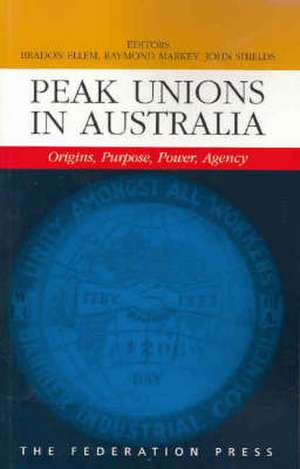Peak Unions in Australia: Origins, Purpose, Power, Agency
Editat de Brad Ellem, Ray Markey, John Shieldsen Limba Engleză Paperback – 30 noi 2004
Preț: 189.18 lei
Preț vechi: 256.81 lei
-26% Nou
Puncte Express: 284
Preț estimativ în valută:
36.20€ • 37.90$ • 29.95£
36.20€ • 37.90$ • 29.95£
Carte indisponibilă temporar
Doresc să fiu notificat când acest titlu va fi disponibil:
Se trimite...
Preluare comenzi: 021 569.72.76
Specificații
Cuprins
Contents Introduction Bradon Ellem, Raymond Markey and John Shields Different Roads to Power: A Comparative Study of National Union Federations Chris Briggs Beyond the 'Will to Unity': Theorising Peak Union Organisation and Agency Bradon Ellem and John Shields The Labour Council of NSW: 1871-2001 Ray Markey Product of a Community in Transition: The First Brisbane Trades Labour Council: 1885-1888 John Kellett The Industrial and Political Role of the Trades and Labour Council of Queensland since 1922: A Reassessment Simon Fry, John Shields and Bradon Ellem The Formation and Role of an Independent Trades and Labour Council in Western Australia Bobbie Oliver The Barrier Industrial Council: A Study in Local Peak Union Origins, Purpose, Power and Decline Bradon Ellem and John Shields Peak Unionism in the Illawarra Ray Markey and Shirley Nixon A Podium for Politics: The Origins and Role of the Rockhampton Trades and Labour Council and Its Predecessors Barbara Webster A Fourth Level Council: The Wagga Wagga District Trades and Labour Council: 1943-1990 Warwick Eather Power and Space in the Victorian Trades Hall Council Cathy Bridgen The End of a Cycle? The Australian Council of Trade Unions in Historical Perspective Chris Briggs
Recenzii
The collection is well organised so that we are led into histories of state and regional peak councils via an international overview …These histories and theoretical structures may also provide a way of looking at the futures of declining movements. Is the current malaise terminal and what can a study of national, state and regional peak bodies tell us about ways forward? Can unions rethink the roles of central offices and revitalise peak regional offices as organising units? Can the regional bodies be part of a revinvention of unions to once again play a role in the social and structural development of the centres in which they are located? … this detailed collection of theoretical and empirical insights may help chart that future course. Labour History, 89 (November 2005) The book is much more than a recitation of facts but rather a deep analysis of the reasons for the successes and failures of peak councils. What holds them together? How do agendas change? Why, at times, do peak councils fragment? Issues of power and labour policies come into play in all of this. Qld Journal of Labour History No1 (Sep 2005) This collection constitutes an important addition to our store of reference material on Australian unionism. Not only does it provide much new information and analysis on that significant but neglected aspect of Australian union history, peak unions, but a number of chapters throw light on another neglected segment of Australian industrial relations, the state systems. This is particularly the case in respect of Queensland, Western Australia and Victoria. The histories of the various peak unions in the those states provide important insights into the social, political and industrial backgrounds that underpin their industrial relations systems. Labour & Industry, Vol 16 No 3, April-May 2006 This is an edited collection of articles on peak unions bodies in Australia. It is in the very best traditions of industrial relations scholarship. Solid, historically informed individual contributions are pulled together with a purposeful but light editorial hand that maintains the distinctive voice and approaches of the authors, although adding an overarching conceptual framework that means the collection is greater than the sum of its parts. … The book provides us with ways of understanding how peak councils might enter a new phase of development in the very chilly ideological and political climate of early 21st century Australia. Journal of Industrial Relations, Vol 47 No 4 (Dec 2005) A thoughtful and at times provocative analysis of peak union councils, this book is an instructive read for union members. Contemporary Australia sees hostility towards unions and collective bargaining increasingly the fare of daily media speculation and thus questions of unity and strength of purpose are central debates. In this context, as in many others, a little historical understanding can be a powerful thing. Peak Unions in Australia is thus a timely and valuable contribution not just to our history but potentially to union futures. I thoroughly recommend it. Sharan Burrow, President, ACTU
